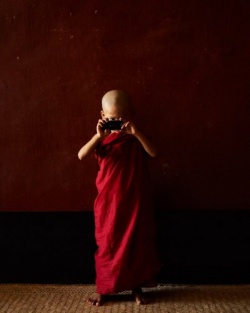Pudgala
pudgala; "person"
1. In Buddhism, Pudgala means the entity that reincarnates as an individual or person, i.e., the bundle of tendencies that keeps an individual reincarnating until they attain enlightenment.
2. In Jainism, Pudgala (or Pudgalāstikāya) is one of the six Dravyas, or aspects of reality that fabricate the world we live in.
The six dravyas include the jiva and the fivefold divisions of ajiva (non-living) category:
dharma (motion),
adharma (rest),
akasha (space),
pudgala (matter)
and kala (time).
Pudgala, like other dravyas except kala is called astikaya in the sense that it occupies space. Pudgala is derived from the words 'pud', which is defined as Supplement (Addition), and gala, which is defined as Disintegrate, or Division. Therefore, Pudgalas are best defined as all things that are continuously changing by the process of Supplementation or Disintegration, namely matter.
The individual unit of Pudgala is the material from which all is made, smaller than atoms, called a Paramänu, which, by the process of supplementation, can combine to form what can be roughly said is an atom, called a Skandha, of which, a part is known as a Desha (an electron, proton, or neutron).
Matter (pudgala) has the characteristics of touch, taste, smell, and colour; however, its essential characteristic is lack of consciousness. The smallest unit of matter is the atom (paramanu). Heat, light, and shade are all forms of fine matter
Pudgala is the essential factor that unifies a person's life processes, It appropriates and sustains a body for a certain amount of time, and constitutes the same person from conception to death, and then extends through other lives.
The pudgala is like a single person wearing different outfits. It is the pudgala that constitutes the person who carries a certain name, lives a certain time, suffers or enjoys the consequences of its acts.
1. Pudgala puggala) an individual, self. Pudgala stands for an individual entity as opposed to a group. It signifies a sentient being who is a mere combination of material as well as mental processes. According to one etymology, human beings are called pudgala-s because they have to undergo afflictions in hell due to their evil actions. [Pun ti vuccati nirayo tasmin galantīti puggalā.]
2. A person, in the everyday sense of an individual.
3. The concept of personhood, particularly in the philosophical sense of an enduring self similar to (but not quite the same as) the eternal soul (ātman), which Buddhism denies.See pudgala-vāda.
(Skr. beautiful, lovely) The soul, or personal entity, admitted by some thinkers even though belonging to the schools of Buddhism (s.v.), they hold that at least a temporary individuality must be assumed as vehicle for karma (q.v.) -- K.F.L.
